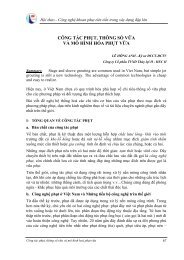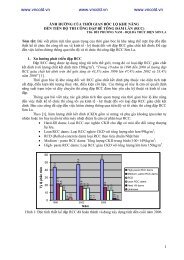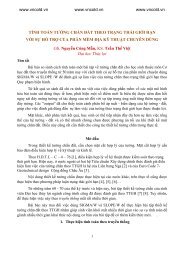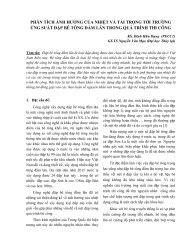Civil Engineering Project Management (4th Edition)
Create successful ePaper yourself
Turn your PDF publications into a flip-book with our unique Google optimized e-Paper software.
34 <strong>Civil</strong> <strong>Engineering</strong> <strong>Project</strong> <strong>Management</strong><br />
for the employer since he can gain an income earlier from the project output.<br />
Early completion also suits the contractor, since his overheads extend over<br />
less time and his profit on the job thereby increases.<br />
The problem with bonuses is that, if unforeseen conditions occur causing<br />
the contractor a delay not of his own making, there may be a dispute about<br />
how much extra time should be allowed to him. Bonuses should therefore be<br />
a reasonable amount; not so large that they put the contractor on a win or lose<br />
situation in respect of his whole profit.<br />
(d) ‘Ex-contractual’ payments<br />
These are payments made by an employer to a contractor which are not<br />
authorized by the contract. They are occasionally paid when a contractor has<br />
performed very much to the satisfaction of the employer but has shouldered<br />
some extra cost clearly not attributable to his own actions, such as exceptionally<br />
bad weather or some other misfortune outside his control. Only the<br />
employer can decide to make an ex-contractual payment, not the engineer or<br />
other person acting on his behalf; and the employer must himself have power<br />
to make the payment. Hence a private person or company may be able to<br />
make an ex-contractual payment; but a public authority will usually have no<br />
such power.<br />
(e) Pre-payments<br />
An employer will rarely make an unconditional pre-payment, that is, a down<br />
payment to a contractor at the start of the contract. He can, however, make early<br />
payment to the contractor for provision of offices, laboratory, and transport for<br />
the engineer’s staff on site, etc. (see Section 15.10). These matters by no means<br />
cover the contractor’s outgoings for his initial set-up, especially when the project<br />
is very large and overseas, so significant advance payments, secured by a<br />
repayment bond, are often allowed.<br />
On the Mangla Dam project in Pakistan the contractor needed to purchase<br />
and bring a vast amount of constructional plant on site. To ease the financial<br />
burden on the contractor, the employer (in effect the government) agreed to<br />
purchase or pay for plant required by the contractor up to a value of 15 per<br />
cent of the contractor’s tender price excluding contingencies. The employer<br />
recovered this expenditure by deducting it in instalments over the first<br />
30 months’ interim payments to the contractor under the contract. In this case<br />
the employer could obtain further security for his down payment by retaining<br />
ownership of the plant until he reimbursed his outlay on the plant.


















